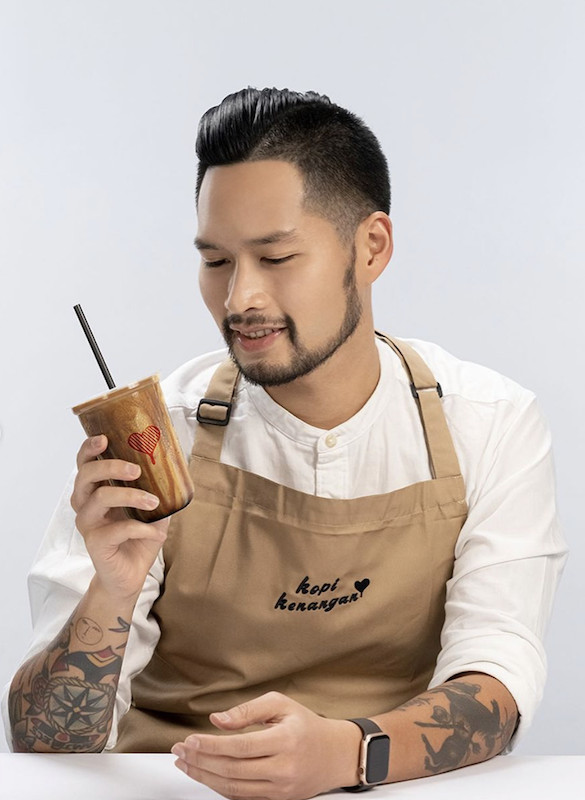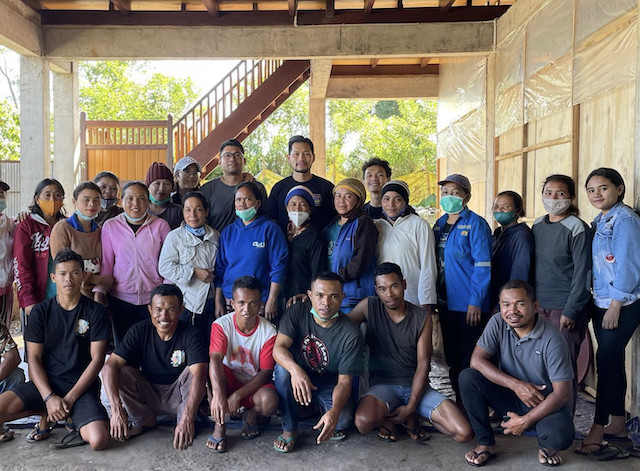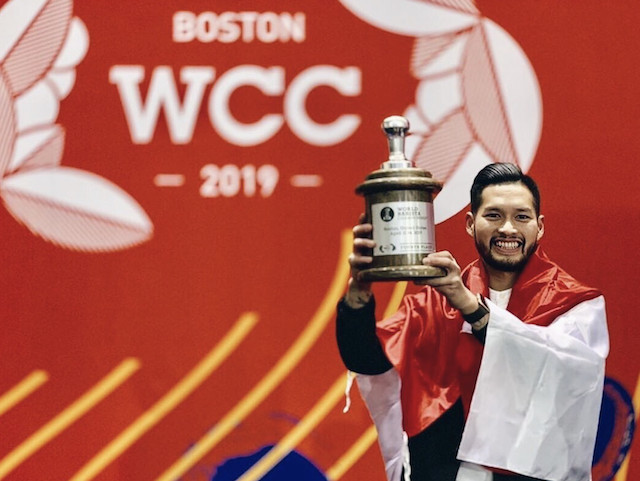Please Update your browser
Your browser is out of date, and may not be compatible with our website. A list of the most popular web browsers can be found below.
Just click on the icons to get to the download page.
Or continue login with
A barista, coffee roaster, brand ambassador and national champion, Mikael Jasin has experienced firsthand the transformative power of coffee.
For most people, a cup of coffee is the pick-me-up they need to start their day. For Mikael Jasin, however, it can be what he calls an “agent of change”.
“Coffee literally changes people’s lives, right? From [things] as simple as waking up in the morning to supporting your livelihood, if you’re a coffee farmer. I am an example of that. My life changed because of coffee. In terms of having the platform that I have and having the life that I have, it’s all because of coffee,” the 32-year-old told The Jakarta Post on June 13.
A barista, coffee roaster, brand ambassador, national champion and now, the head of his own company, Mikael has always stuck to his belief that coffee can change people’s lives as well as the whole country, considering that Indonesia is one of the world’s biggest coffee producers.
Another conviction that fuels Mikael in his endeavors is how the hard work of people in the coffee supply chain, above all else, is the key ingredient in a morning cup of joe. It is the kind of hard work that, unfortunately, often goes unnoticed.
“What people need to understand is that there are so many ends that help deliver this coffee into your glass, all the way from people who plant and cultivate the seeds,” he noted. Carving paths: Mikael Jasin poses with a coffee beverage in an apron bearing the logo of Indonesian coffee specialist and chain Kopi Kenangan, where he is the head of coffee. (Instagram/Mikael Jasin) (Instagram/Mikael Jasin)
Carving paths: Mikael Jasin poses with a coffee beverage in an apron bearing the logo of Indonesian coffee specialist and chain Kopi Kenangan, where he is the head of coffee. (Instagram/Mikael Jasin) (Instagram/Mikael Jasin)
Brewing balance
Born and raised in South Tangerang, Banten, Mikael said he underwent a few rites of passage growing up, such as struggling with his weight in his early teens.
“I liked food, but also, I had to take medication for asthma. Like, I had to take the steroidal inhalers, so that got me quite obese,” he recalled.
“I’m only saying this because I think that shaped me as a person to this day. Like, I’m not a super athlete or anything, but I try to keep a balance [in] being healthy, watching what I eat, exercising and [other things].”
Going to a Catholic junior high school he described as “strict” also taught Mikael how to be “disciplined” in his future endeavors. “I like having structures in my life, so that’s pretty good,” he added.
He also suffered a period of frailty after losing more than 30 kilograms.
“Apparently, when you’re that [young], you’re not supposed to lose that much,” said Mikael, who eventually got his weight under control and became “athletic” through baseball and softball after entering senior high school. He then decided to “hang up my gloves” to continue his education at the University of Melbourne in Australia, a period he called a “sort of like, late teenage, early adolescent type of thing”.
“I moved when I was 18. I didn’t know anybody. I didn’t let my parents go with me to Australia. To me, as an only child, I was looking forward to it because there was some sense of independence, you know?” he recounted. At the same time, his younger self was certain he could manage his freedom, considering how his past experiences had taught him how to “maintain some sort of discipline”. Full circle: Coffee farmers pose with Mikael Jasin (center, rear), whose coffee consultancies, CATUR Coffee Company and So So Good Coffee Company, are helping to empower them. (Instagram/Mikael Jasin) (Instagram/Mikael Jasin)
Full circle: Coffee farmers pose with Mikael Jasin (center, rear), whose coffee consultancies, CATUR Coffee Company and So So Good Coffee Company, are helping to empower them. (Instagram/Mikael Jasin) (Instagram/Mikael Jasin)
Melbourne beginnings
Mikael was barely 19 years old when his father threw him a curve ball.
“My dad called me up, basically saying, ‘We don’t have enough money to support your living in Australia. We can still pay for your school just enough, but you have to start looking after yourself.’”
This eventually led Mikael to his first job in the coffee industry: a barista at Manchester Press, one of the more well-known cafes in Melbourne. The cafe was where his inquisitiveness for all things coffee started taking shape, fueled by his observation that Melbourne “was considered as the number-one spot for coffee in the world” at the time.
As Mikael continued cutting his professional teeth at Manchester Press, it dawned on him that being a coffee roaster might be his ideal vocation after all.
“For someone interested in the creative side of things, coffee was one of the more logical choices [for me]. Back in Melbourne, a barista is seen as a rock star. It’s the next ‘celebrity chef’,” he gushed.
Another aspect of the coffee world that Mikael learned about and came to cherish was a “sense of community” that he felt did not exist in any other industry. This ultimately encouraged him to stay in Melbourne after he graduated university.
“As long as you’re a barista or a coffee roaster, no matter where you are in the world, you are accepted because you are a coffee person. It doesn’t really matter where, because it’s a very passionate industry,” he said.
“In a lot of ways, I’m very thankful that my parents didn’t have enough money to support me,” he said, laughing. “Without that hardship, I wouldn’t [have become] a barista and if I wasn’t a barista, we wouldn’t be having this conversation. So, it all works out in the end.”
After extending his stay in Melbourne, Mikael went on to obtain his master degree at the Royal Melbourne Institute of Technology. It was then time to decide if he wanted to commit himself to the coffee world.
“I stayed because I believe that coffee is a vehicle of change and I would like to be a part of that change,” he summed up. Setting the bar: Mikael Jasin wins a place in the top four at the 2019 World Barista Championship in Boston, the United States. (Instagram/Mikael Jasin) (Instagram/Mikael Jasin)
Setting the bar: Mikael Jasin wins a place in the top four at the 2019 World Barista Championship in Boston, the United States. (Instagram/Mikael Jasin) (Instagram/Mikael Jasin)
Makings of ‘good’ coffee
Mikael made waves in his home country when, representing Indonesia, he reached the top four at the 2019 World Barista Championship in Boston, the United States. Two years later, he cracked the top seven at the 2021 championship in Milan, Italy.
Mikael said he treated these championships as if he were competing in American Idol with the approach that “you don’t have to win, you just have to make a good impression and then your career trajectory will change”.
“I didn’t really care if I were in the finals or if I won or if I placed 30th. I just wanted to do the best that I could,” he explained. “But I was pretty confident back then because I knew how much work I put in and I knew that not everybody worked as much.”
Still, he was fully aware of his accomplishment’s relevance for his home country.
“Now we have arrived! I was the first Indonesian to make it to the final. It wouldn’t have happened without the people [who came] before me. It wouldn’t have happened without the champions before me, obviously, because they paved the way,” said Mikael, underlining that when all was said and done, his milestone was also a “reflection on the industry”.
His endeavors during the global barista competition also taught him another lesson: “You can do whatever you want, if you put your mind and body to it,” he said, chuckling.
Mikael’s life changed once again: He was appointed as the head of coffee for Kopi Kenangan and established two coffee consultancies: CATUR Coffee Company and So So Good Coffee Company. As if his schedule was not packed enough, he was recently appointed as an Indonesian brand ambassador for the Italian coffee machine brand, Victoria Arduino.
The offer to join Kopi Kenangan arrived immediately after the 2019 barista championship and once again, generating the necessary change was what compelled Mikael to sign on with the coffee chain.
“My role there is to help them source coffee from across Indonesia. They only use Indonesian coffee, which is a challenge because Indonesian coffee is not the cheapest coffee out there,” he explained. “The challenge is how to source good-quality coffee that is still accessible and affordable.”
So, at the end of the day, what makes a good cup of coffee?
“If you start digging more and thinking more and being mindful about the cup of coffee you drink, what you consider ‘good’ might change,” he replied.
TJP Documentaries: Viral Chef Vindy Lee Takes Our Indonesian Snacks Etiquette Challenge
TJP Documentaries: Yogyakarta 'fight club' keeps teens away from Klitih gang crimes
TJP Documentaries: Citayam Fashion Week Sees Youth Reclaim Jakarta's Public Space
© 2016 – 2022 PT. Bina Media Tenggara